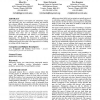Free Online Productivity Tools
i2Speak
i2Symbol
i2OCR
iTex2Img
iWeb2Print
iWeb2Shot
i2Type
iPdf2Split
iPdf2Merge
i2Bopomofo
i2Arabic
i2Style
i2Image
i2PDF
iLatex2Rtf
Sci2ools
119
click to vote
PDC
2004
ACM
2004
ACM
Participatory design with individuals who have amnesia
We present experiences and insights into participatory design with individuals who have anterograde amnesia and therefore have extreme difficulty storing new memories. We discuss our design of the design process, and present a set of techniques used to support memory during and between design sessions. From this experience, we identify cognitive assumptions of participatory design that break down when working with amnestics. We generalize these ideas into an analytical framework for researchers and practitioners who intend to use participatory design with persons having various kinds of cognitive impairments. We illustrate the framework by analyzing a cognitive deficit unrelated to memory that we encountered, and an unanticipated benefit from what at first appeared to be a liability in working with this design team. Categories and Subject Descriptors K.4.2 [Computers and Society]: Social Issues – Assistive technologies for persons with disabilities. General Terms Human factors, desi...
Related Content
| Added | 30 Jun 2010 |
| Updated | 30 Jun 2010 |
| Type | Conference |
| Year | 2004 |
| Where | PDC |
| Authors | Mike Wu, Brian Richards, Ronald Baecker |
Comments (0)

